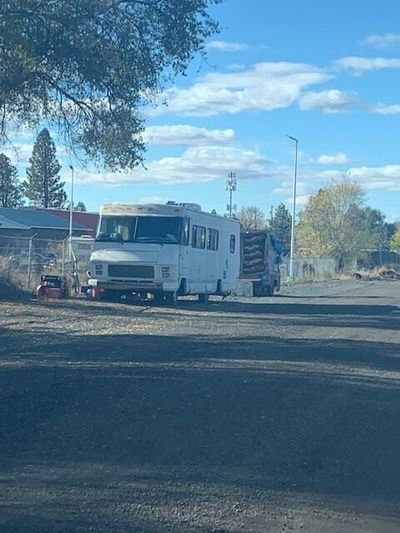Abandoned RVs piling up after Washington’s program put on pause that reimbursed disposal

There are dozens of abandoned or disabled RVs littering Spokane’s streets, and for the past two months, the city has had no way to have them hauled off and destroyed.
Whenever an RV owner renews their tabs, they pay $6 into an abandoned RV disposal fund created in 2018. Since 2019, when cities request that a tow or wrecking company haul away an abandoned RV, that company has been able to request reimbursement from that state fund to pay for the costs.
This fund has been essential to removing the derelict vehicles, because unlike abandoned car or most other types of vehicles, the costs of demolishing an RV that can’t be sold at auction significantly exceed whatever value can be recouped – typically in the range of $1,000-2,000, according to Spokane Police Department Sgt. Teresa Fuller. Before 2019, either the city would compensate tow companies themselves, or else they had begun to regularly refuse to respond to requests to have them removed, said Luis Garcia, director of Spokane’s code enforcement team, in an interview.
“It was a burden for vehicle wreckers because they would lose money disposing these vehicles,” Garcia said. “The program is new, and the state recognized a need, because whenever RVs are put into circulation in the state, there’s not really an end of life planned for them.”
But in mid-September, with little warning, new reimbursement requests were no longer being accepted. The abandoned RV fund has technically not run out, said Christine Anthony, a spokesperson for the state Department of Licensing, which operates the program. Instead, the department’s authority to spend from that fund ran out and will need to be renewed by lawmakers during the upcoming 2025 legislative session, Anthony said.
Usage of the program by cities like Spokane has grown rapidly, according to data provided by the Department of Licensing. In its first year, 171 abandoned RVs were demolished or removed, with more than $42,000 reimbursed out of the program. In fiscal year 2023, that number jumped to 1,061, with the state paying nearly $1.4 million.
The number of retrieved RVs stayed steady in the most recent fiscal year, which ended in June, but the cost of reimbursement jumped to more than $2 million. Between July 1 and Oct. 31, there were requests for another $950,000 worth of reimbursements – the state has only paid out $113,000 of those.
By October, only around a month after the state had stopped processing reimbursement requests, there was a backlog of 30 abandoned or disabled RVs that the city was not able to have removed, according to data provided by code enforcement.
Councilman Michael Cathcart argues the problem is about more than an eyesore on city streets.
“A lot of these RVs are used as drop sites for drugs or stolen goods, and a lot of folks who are not up to good things, oftentimes, are residing in these,” Cathcart argued. “Not always, but oftentimes.”
Fuller agrees.
“If you talk to any of the neighbors who have these RVs in their neighborhoods, they tend to attract crime and garbage in the roadways and on the sidewalks,” Fuller said. “And it’s a safety thing. We’ve had a couple of these that don’t run, they have sewage backed up in them, and it’s not safe for the neighborhood or the people living in them.”
On Oct. 21, Cathcart unsuccessfully argued for pulling funding away from homeless services and set aside $100,000 to cover removal with the hope that the state may compensate the city when its fund is no longer on pause.
While he supports the state potentially increasing the registration fee to better fund the abandoned RV removal fund, he worries that the state cannot be relied upon to fund this and other programs, given Washington is potentially facing a $10-12 billion deficit over the next four years.
“At the end of the day, this comes down to a safety issue,” Cathcart said. “There’s a lot of nuisance activity that goes on along these trailers and RVs.”
Garcia stressed that code enforcement and the police department’s abandoned auto unit haven’t stopped responding to calls for these vehicles. Both departments will attempt to make contact with an owner and educate them on relevant laws or cite them if relevant.
“We’re still responding to all these cases we get, and not all of these RV cases result in an impound,” Garcia said.
“Whether it be a passenger vehicle or nonpassenger vehicle like an RV, we try to exhaust all of our administrative remedies before an impound.”